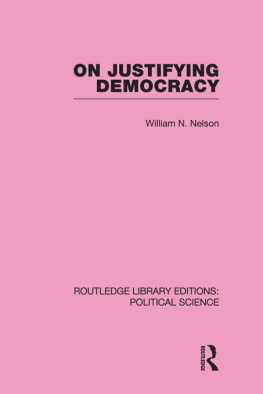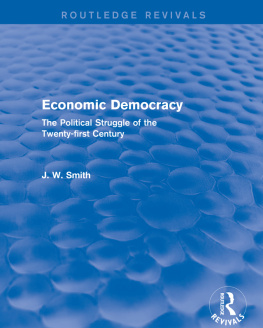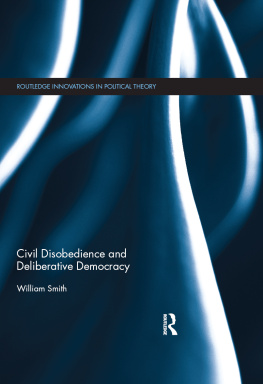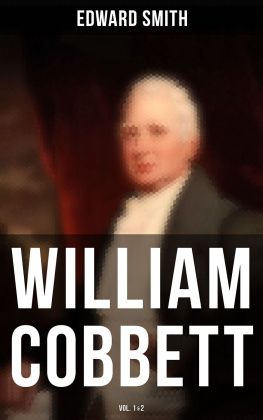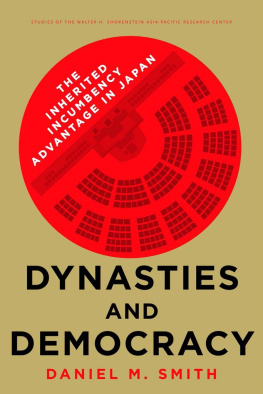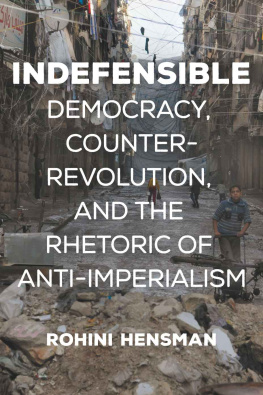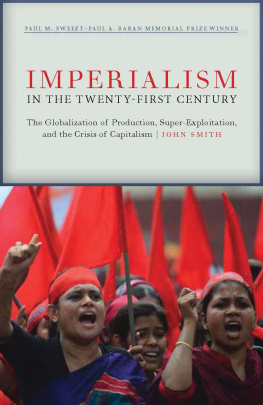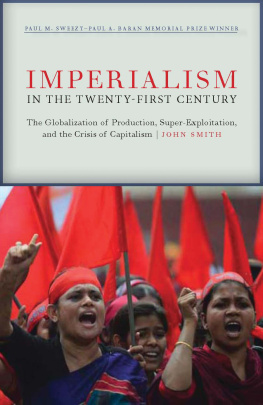William S Smith - Democracy and Imperialism
Here you can read online William S Smith - Democracy and Imperialism full text of the book (entire story) in english for free. Download pdf and epub, get meaning, cover and reviews about this ebook. publisher: University of Michigan Press (limited), genre: Politics. Description of the work, (preface) as well as reviews are available. Best literature library LitArk.com created for fans of good reading and offers a wide selection of genres:
Romance novel
Science fiction
Adventure
Detective
Science
History
Home and family
Prose
Art
Politics
Computer
Non-fiction
Religion
Business
Children
Humor
Choose a favorite category and find really read worthwhile books. Enjoy immersion in the world of imagination, feel the emotions of the characters or learn something new for yourself, make an fascinating discovery.

- Book:Democracy and Imperialism
- Author:
- Publisher:University of Michigan Press (limited)
- Genre:
- Rating:4 / 5
- Favourites:Add to favourites
- Your mark:
- 80
- 1
- 2
- 3
- 4
- 5
Democracy and Imperialism: summary, description and annotation
We offer to read an annotation, description, summary or preface (depends on what the author of the book "Democracy and Imperialism" wrote himself). If you haven't found the necessary information about the book — write in the comments, we will try to find it.
Democracy and Imperialism — read online for free the complete book (whole text) full work
Below is the text of the book, divided by pages. System saving the place of the last page read, allows you to conveniently read the book "Democracy and Imperialism" online for free, without having to search again every time where you left off. Put a bookmark, and you can go to the page where you finished reading at any time.
Font size:
Interval:
Bookmark:
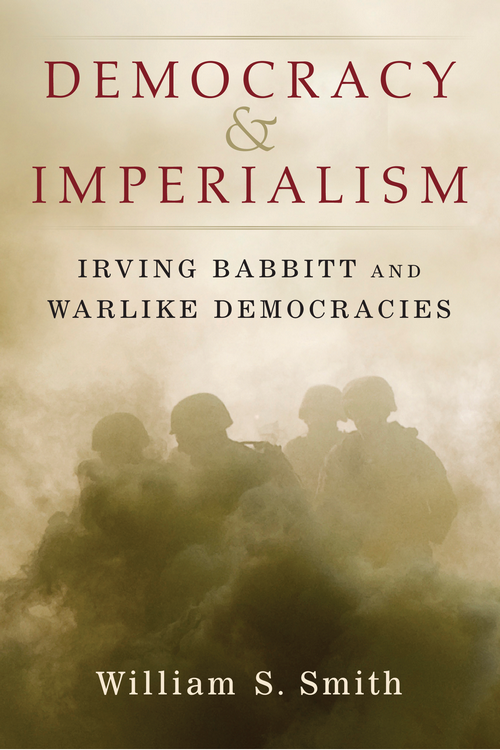
After costly US engagement in two major wars in the Middle East, foreign policy debates are dominated by questions about the appropriateness of American military interventions. A central issue is whether an interventionist foreign policy is compatible with the American constitutional tradition and the temperament this tradition requires.
The book examines the unique contribution made by Irving Babbitt (18651933) to understanding the quality of foreign policy leadership in a democracy. Babbitt explored how a democratic nations foreign policy is a product of the moral and cultural tendencies of its leaders and how the substitution of expansive, sentimental Romanticism for the religious and ethical traditions of the West would lead to imperialism.
Democracies that lack political restraint and tend toward plebiscitary practices and outcomes are more likely to be warlike and imperialistic. The United States has been moving away from the restraining order of sound constitutionalism and increasingly trying to impose its will on other nations, a trend that will inevitably cause the United States to clash with the civilizational regions that have emerged in recent decades. How to address the problem of tension between civilizations is a subject to which Babbitt, showing characteristic foresight, devoted much attention. This book brings the question of soul types to issues of foreign policy leadership and discusses the qualities in leaders that are necessary for sound foreign policy.
William S. Smith is Research Fellow and Managing Director of the Center for the Study of Statesmanship at the Catholic University of America.
William S. Smith
University of Michigan Press
Ann Arbor
Copyright 2019 by William S. Smith
All rights reserved
This book may not be reproduced, in whole or in part, including illustrations, in any form (beyond that copying permitted by Sections 107 and 108 of the U.S. Copyright Law and except by reviewers for the public press), without written permission from the publisher.
Published in the United States of America by the
University of Michigan Press
Manufactured in the United States of America
A CIP catalog record for this book is available from the British Library.
Library of Congress Cataloging-in-Publication data has been applied for.
ISBN 978-0-472-13153-2 (hardcover : alk. paper)
ISBN 978-0-472-12593-7 (e-book)
Cover credit: US Air Force photo/Tech. Sgt. Mark R. W. Orders-Woempner.
To Laura
Amor Vinci Omnia
Digital materials related to this title can be found on the Fulcrum platform via the following citable URL: https://doi.org/10.3998/mpub.11301249
T.S. Eliot wrote of Irving Babbitt, To have been once a pupil of Babbitts was to always remain in that position... His ideas are permanently with one, as a measurement and test of ones own. Such sentiments reflect mine regarding my mentor, Professor Claes Ryn of The Catholic University of America. Professor Ryns personal support for my academic work, extending now over many decades, has only been surpassed by the influence of his ideas on my own and their relevance to the contemporary challenges of the United States.
This book would not have been possible without my wife, Laura. When I left a business career and pursued a path in academia, she offered the same unwavering support and encouragement that she has always provided to all of our family. My thanks also to my dear children, Therese, Burke, and Margaret, for their interest in their fathers new endeavors, and their understanding about how important this subject is to me.
I would like to offer additional words of gratitude to our friends and family whose constant enthusiasm provided needed ballast to my work, especially Page and Katie Wilson, Patrick and Jennifer Donovan, Dana Nickel, Celeste Wilson, and Nadia Schadlow.
I am grateful to the superb team at the Harvard University Archives where Irving Babbitts papers are held. I also cannot neglect to note my admiration for my colleagues at Catholic University who courageously pursue a constant stream of ideas that will not ingratiate them to the foreign policy establishment, a mark of distinction.
Page x My editors at the University of Michigan Press, Elizabeth Demers and Kevin Rennells, are consummate professionals and they made the load of such a challenging project so much lighter.
Finally, to the men and women of the American military and their families, who have borne the terrible burden of Americas recent wars of choice, may you be blessed with temperate leaders like George Washington, who understood that Americas true calling is to be a virtuous republic, not an empire.
The fortune of princes changes with their character.
Sallust, The War with Catiline
Imperialism, as a national motivation, generally has pejorative connotations across the political spectrum. Imperialism implies the forced imposition of the will of one people upon another people who oppose the political, cultural, or economic changes being imposed. Imperialism is widely viewed as an unjustified violation of national sovereignty.
While imperialism, as an abstract concept, meets with near universal opprobrium, in concrete historical circumstances actions that constitute genuine imperialism are sometimes in the eye of the beholder. Historians of ancient Rome, for example, have regularly debated whether the growth of Roman power derived from a culture with imperial ambitions or whether pervasive outside threats to the Roman republic caused Rome to conquer other peoples.
Recent US foreign policy actions have generated similar debates. During the Cold War, left-leaning foreign policy observers viewed American interventions in nations such as Vietnam as imperialistic adventurism, while right-leaning observers viewed such interventions as strategic responses to existential threats to US security. In the postCold War environment, similar disagreements have emerged. President George W. Bush, for example, argued that the spread of freedom and democracy through military interventions was a humanitarian cause and represented a defensive strategy by the United States to prevent future terrorist attacks, while critics argued that such military interventionism embodied military, political, and cultural imperialism.
Page 2 Arriving at precise agreement about the nature of imperialism seems to take on added complexity in democratic regimes. Imperialism is readily recognized in tyrannical regimes that brutally suppress internal dissent and invade their neighbors for obvious economic, strategic, or political advantage. Democratic nations, however, with their implicit popular legitimacy, seem to enjoy a certain inoculation against having their foreign wars characterized as imperialistic. To secure popular support for foreign policy initiatives, leaders of democracies tend to assert altruistic or humanitarian motivations. For this reason, the citizens of democratic nations may have difficulty in recognizing imperialism on the part of their own countries because of the assumption that the nations actions have pure motives and popular sanction.
While democracies seem weaker at self-diagnosing imperialism, the historical record reflects some ambiguity about whether democracies are indeed less disposed to imperialism than other regime types. Numerous historical examples point to democratic or quasi-democratic regimes that did in fact develop unjust and tyrannical characteristics and tended toward imperialism. Ancient Greece and Rome as well as Jacobin France are but three important examples. The Framers of the American Constitution were acutely aware of the decline of democracy in the classical world and, when constructing the Constitution, attempted to install bulwarks against the tendency of democracies to degenerate into class conflict, to suffer a loss of liberty at home, and to engage in foreign adventurism abroad. One could make the argument that the spirit of the original Constitution was anti-imperialistic.
Next pageFont size:
Interval:
Bookmark:
Similar books «Democracy and Imperialism»
Look at similar books to Democracy and Imperialism. We have selected literature similar in name and meaning in the hope of providing readers with more options to find new, interesting, not yet read works.
Discussion, reviews of the book Democracy and Imperialism and just readers' own opinions. Leave your comments, write what you think about the work, its meaning or the main characters. Specify what exactly you liked and what you didn't like, and why you think so.


